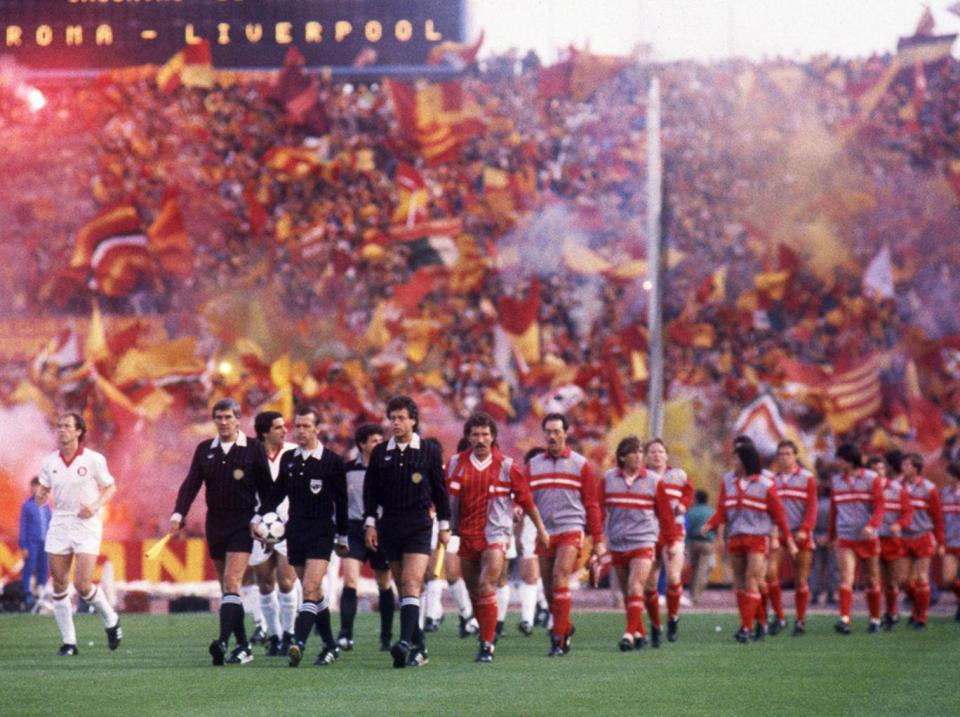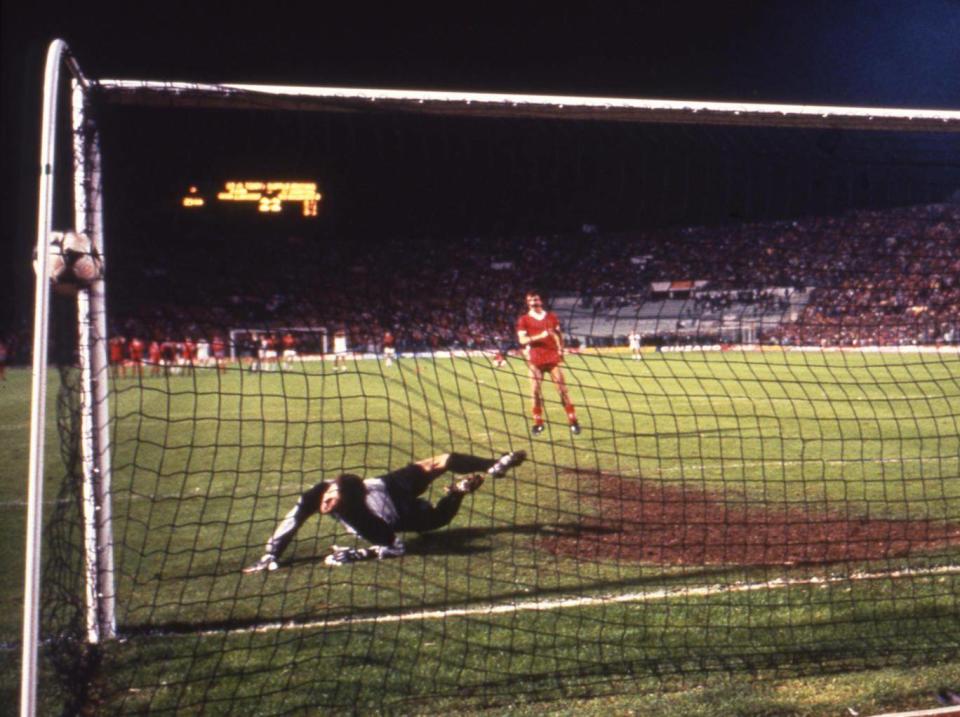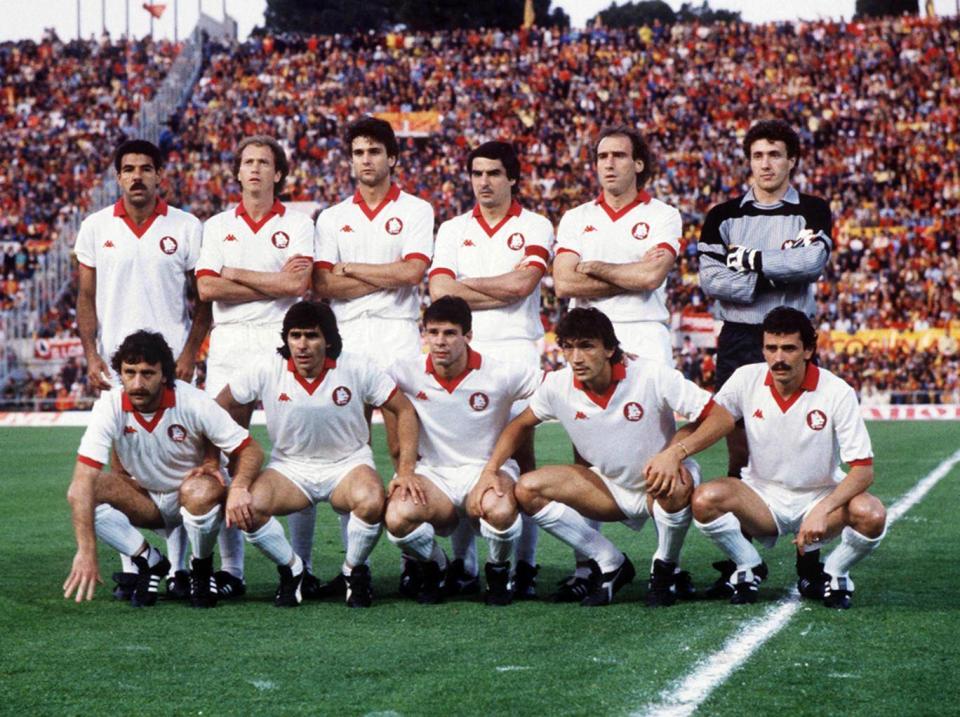Why Liverpool’s victory over Roma in 1984 was a glorious night with tragic consequences in more ways than one
Graeme Souness was at the front of the line, his tracksuit top unzipped already – as if war could not come soon enough. Bruce Grobbelaar was behind him, who’d already fought war in Rhodesia. Something had amused him. He was laughing his head off, as if to say, “This is nothing.”
The background is the Olympic Stadium but you cannot see the terraces because of the inferno of smoke: red, orange and yellow. It was 1984 and Liverpool were about to play AS Roma at their home ground.
Check out the photograph:

It is impossible to rank victories in football and define one as being absolutely the greatest. Yet if there was a top five in Liverpool’s history, surely this would feature amongst the collection. Liverpool’s dominance of the domestic scene and Europe meant success was expected and so, it was not necessarily a surprise when they went to Italy and won a final on the opponent’s own patch, albeit via penalty-kicks.
And yet, if you listen to the stories of the players and the supporters, you realise this was different. It was a glorious achievement with tragic consequences in more ways than one.
David Hodgson was a Liverpool substitute. He was well liked to the extent he was invited on the team’s end of season trips to Marbella in successive summers after leaving for Sunderland. In Rome, every attempt was made to make Liverpool’s players feel like they were entering the Colosseum as the doomed. Hodgson was at the back of the queue in the tunnel.
“I could see how much everyone was really pumped up,’ he recalled. “So, I broke into song. It was the Chris Rea number, ‘I Don’t Know What It Is But I Love It’. I was in charge of the music box and had been listening to it that day.
“All the Roma boys were there: Falcão, Conti, Cerezo, looking all serious. So, I led: ‘I don’t know what it is but I love it . . .’ Craig Johnston followed with the next line and then all of the Liverpool joined in. It was spontaneous. The Roma boys seemed unnerved by it.
“We could hear the fans outside whistling – Rome was an intimidating place to be. But that was us. We were telling them: “We’re not scared and we really don’t give a shit where we are or what you can throw at us, because we’re going to win this game.’”
Maybe it explains the contrasting expressions of Souness and Grobbelaar. Liverpool’s leader was Souness, a gladiatorial presence, who knew he was signing for Sampdoria. Liverpool’s goalkeeper was the unconventional Grobbelaar, whose spaghetti legs routine in the shoot-out pre-empted Francesco Graziani’s crucial miss.
If the mood in Rome could be described generously as chaotic, then Liverpool’s preparations were perfect. Eight days before, Liverpool played a friendly against the Israeli national team in Tel Aviv. “It was supposed to help us acclimatise to the more humid weather in Rome,” remembers Michael Robinson, another substitute.
“Instead, the trip was in essence a major p*ss-up, and Joe [Fagan] gave Graeme a wad of money to take us all out to forget about the final that was looming.” What followed was a series of stories in La Stampa, the Italian tabloid newspaper, which depicted Liverpool’s players acting like a gang of British holidaymakers on an 18-30s trip. “Meanwhile, the Roma players were stuck in the Dolomites contemplating the game and getting wound up,” Robinson adds.
Not quite as wound up, though, as Rome itself, where trouble was waiting on the streets for the 15,000 Liverpudlians that had made the journey to Italy, half the figure that went in seven years earlier when Liverpool won their first European Cup in the same city with a victory over Borussia Mönchengladbach. The drop in the number of travelling supporters reflected how Margaret Thatcher’s Conservative government reduced income levels across Merseyside during the 1980s. Many that did go do not speak of the experience fondly.
Upon arrival at Termini, the main train station, there were riot police carrying machine guns and CS gas. Roma were champions of Italy and, having not won a European trophy before, felt a sense of destiny that it would happen for the first time in their own city. Liverpool had questioned the logic of holding a European Cup final on the home ground of one of the finalists, but UEFA did not listen.
‘The canapés were ordered, the Pinot Grigio was on ice, the five-star hotel suites had been assigned and the club-class suites booked,’ as Brian Reade, noted in his memoir, 43 Years with the Same Bird.
It is draining to read Jegsy Dodd’s account of what happened next after he travelled via train from Rimini. ‘We were well and truly under siege from the moment we arrived until the moment we left, or should I say escaped?’ Dodd wrote in the book Here we go Gathering Cups in May.

‘They say all roads lead to Rome but after our final penalty I’d have given anything to see just one that led out of this f**kin hellhole. Most people refer to the ’84 final as the Grobbelaar wobbly-legs final but to anyone who was there it was the ‘smoke, tear gas, and flare final.’
Somehow, Liverpool found a way to prevail in this atmosphere. “It was like the Christians being fed to the lions,” Robinson says.
“There were banners outside specially welcoming the English infidels. But it never crossed my mind that we’d lose. We were brainwashed into believing we’d win. Graeme [Souness] was a Trojan that night. Every player on the pitch was in awe of him. He was brave and magnificent, and led the team like a warrior. Roma had Falcao and Cerezo – two fantastic Brazilian players in midfield. But I forgot they were playing, because of Graeme’s performance.”
Defeat for Roma meant wrath for Liverpool supporters. ‘Before and after the match Roma fans stabbed, slashed and brutalised the away supporters on a mass scale,’ writes Tony Evans in his recently released, Two Tribes.

The reaction the following morning in Italy was one of immense embarrassment. La Republica headlined, ‘Manhunt against the English,’ Il Corriere dello Sport reported, ‘The aftermath of the match brought a night of vile, blind violence that disappointment cannot justify,’ and Il Tiempo said, ‘This could have been an occasion to demonstrate civility. Instead, the usual group of fans with knives, bottles and sticks went on an odious manhunt,’
On a Radio City press bus, one journalist helped a bleeding fan and yet, the violence was barely given any coverage in the English press. ‘The festering resentment towards Italian ultras played a significant role in the build-up to Heysel,’ Evans insists. Meanwhile, Dodd can remember finally getting home and telling friends about his concerns if Liverpool ever met another Italian team in a final at a neutral venue.
Heysel would happen twelve months later. Thirty-nine people, mostly Juventus fans, died in Brussels when a wall collapsed as they tried to escape from a riot.
Tragically, there is a feeling that Rome ’84 had another victim. On 30 May 1994, ten years to the day after the final, Agostino Di Bartolomei, the Roma captain, took his own life on the balcony of his villa, shooting himself once through the heart with a .38 Smith and Wesson pistol. Only a note in his pocket, which had been torn into 32 pieces, gave indication of di Bartolomei’s torment. Financially, there had been problems but he had also struggled to find space ‘in the world of football,’ following retirement.

‘The date he chose to take his life could not have been a coincidence,’ John Foot suggests in Calcio. ‘He could have been the player – the captain – who had lifted the European Cup in his own city.’
Di Bartolomei had described the final as “the game of my life.”

